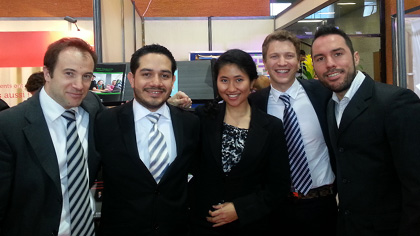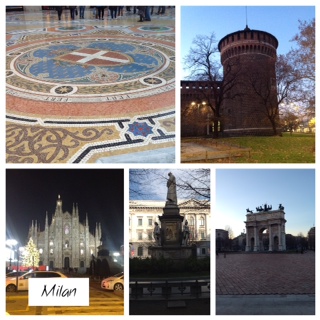A week ago tonight, the Global MBA students boarded their Emirates flight and flew to Dubai aboard the spacious A380. During a short layover in Dubai, students got coffee, shopped duty free, and sat down to an Arab breakfast before lining up for flight number two to Singapore’s Changi airport. They arrived in Singapore on Thursday night and were greeted by the shuttle service that would take them to their residences, apartments off of Orchard Road. Unfortunately, the shuttle driver got a bit confused and accidentally took them first not to the residences, but to a luxury hotel owned by the same company. A short change in style and a few blocks away, the students were able to get unpacked and settled in at what will be their home for the next six weeks.
The Chinese New Year holiday made the first weekend a long one, with no classes or activities scheduled for Friday. With three days to explore, some spent time taking care of business, getting phone cards and metro passes and stocking their refrigerators. Others set out to see the sights in this dynamic and unique Asian city state. At Marina Bay, the Singapore Flyer takes thirty minutes to rotate, giving riders an impressive view of the skyscrapers along the Singapore River and the island’s edge. At a slightly more dramatic elevation is the Marina Bay Sands hotel, a giant ship on three towers rising high above the water. Here, guests can relax in the world’s tallest infinity pool, or visitors can gamble, dance, and admire the view into the wee hours. In the same neighborhood, but perhaps more tailored to those with a fear of heights, Clark Quay along the river’s edge provided enough restaurants and people watching to make a Friday night entertaining, and the picturesque colonial architecture stands in striking and quaint contrast to the modern high rises that make up the downtown backdrop. Dotted with parks and museums, statues and opera houses and outdoor amphitheatres, palm trees and the scent of flowers, Singapore retains a tropical feel despite being a big city.
What is perhaps the most impressive here, especially for a group of visitors from Paris, is the cleanliness. The sidewalks are immaculate. That combined with the orderly, law-abiding, and courteous conduct of the Singaporeans (no jay-walking and no line cutting) has made for a definite change of scenery. You just always have to be certain to look both ways before crossing the street; as a former British colony, Singaporean traffic comes from the right.
Venturing away from the modern façade of the city, students spent time exploring the smaller neighborhoods that make Singapore’s heart beat. Chinatown was a fun and hectic blur of red lights and steaming food stands, where dinner consisted of fried rice, dumplings, satay, Singaporean
“carrot cake” (which is not really a carrot cake at all) and juice from fresh coconuts. The small steets showcased the colorful colonial architecture of old Singapore and housed a plethora of noisy, overflowing restaurants and shops.
[gallery columns="5" ids="847,848,849,850,851,852,853,854,855,856,857,858,859,860,861,862,863,864,865,866,867"]
Not far away is Little India, where many immigrants from the subcontinent have traditionally made their home. Just as busy as Chinatown, Little India’s hustle and bustle is of a different flavor, with people drinking pulled tea and lassi, vendors selling different vegetables and spices, vibrant scarves and tapestries hanging in storefronts, and Bollywood music ringing out of CD and DVD shops. The huge and densely packed Mustafa Center sells everything from cell phones to shampoo, from chocolates to watches, acts as a money exchange and a travel agent and takes up a whole corner of the neighborhood. It is a totally unique retail experience, very different from the slick, air-conditioned and abudant Singaporean shopping malls.
Everywhere, there is food. From the hectic hawker centers, dishing up chicken and rice in a variety of sauces and styles, to upscale Western restaurants and familiar chains for a taste of home, there’s something here for everyone and plenty of opportunity to be adventurous. Dishes both new and familiar are available on every corner, and from any Asian cuisine you can think of: Chinese, Malaysian, Indian, Singaporean, Thai, Vietnamese, Japanese, Korean… there aren’t enough meals in the day to try them all. Singaporeans spend more time eating out than in, and it’s evident; the street-side eateries are packed and lively all day long.
To catch a breath of fresh air outside of the concrete jungle and the flashy shops of Orchard Road, the Botanic Gardens have proven to be a lovely oasis for joggers and zen-seekers alike. Just ten minutes along an embassy and mansion-lined street from the students’ apartments, this collection of gardens and ponds and tropical plants is a green haven, fragrant with the scents of jasmine, populated by turtles and koi and swans, buffered from the road by towering banyan trees.
The students are now halfway through their first week of courses, which include Critical and Analytical Thinking, Geopolitics in Asia, and How to Negotiate Business Deals in China. For those who don’t speak Mandarin, a beginner class is offered twice a week, as well. Throughout the term, classes are supplemented by regular conferences and speakers, visits to companies, and career-oriented workshops and events. Between the academic content, these hands-on activities, and the traveling and exploration the students will be doing in their free time, they should return to Paris at the end of March with a nuanced and thorough understanding of living and doing business in this region… and maybe a tan, too!




